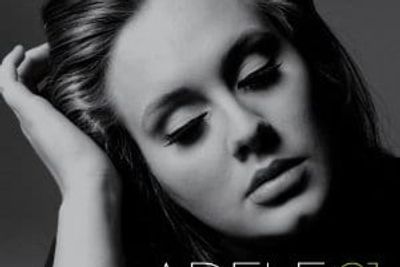No doubt the tabloids linger too long on the appearance of female pop stars, especially those who don't (or won't) conform to the norm. And while most of her peers prefer tight aerobic wear, Adele Adkins, 22, dresses in retro-glam attire, mostly in basic black, that accentuates her curves. In a culture obsessed with being skinny, the London native is confident with her beautiful full figure, as she should be. End of story and on with the song.
Adele succeeds without needing sparkling cone bras or metal-spiked thongs to announce her talent. In the playground of pop stars-cum-models, she rises head and shoulders above the scrum. It's her powerful voice that really separates the woman from the girls. That throbbing alto, at once regal and audacious, is an irresistible force and serves as the centerpiece of her second album, 21.
At times, Adele does try too hard to act older, like a doting daughter toddling around in her mother's heels. Inspired largely by a former beau, 21 marks a large leap forward from her teenage dreams to adult realities. "Rolling in the Deep," the Dusty Springfield homage that serves as the project's first single, is the ultimate case of a diva in distress. Too distraught to taunt a nasty ex, she lets her harmony singers do the dirty work: "You're gonna wish you never had met me," they mock as she moans. Her grief finally gets the best of her on the thundering "Set Fire to the Rain," an aural equivalent of looking into the gray English sky and letting out a scream.
21 relies heavily on her glorious pipes, but Adele sprinkles in a series of thoughtful passages where she comforts lovelorn friends and offers musical counsel. And even when the quality of songs sags, her voice reveals the thrilling intensity of being young and restless. Adele, in this tense moment of passage, accepts some blame for her messy affairs: "I know I have a fickle heart and bitterness," she admits at one moment; "Please forgive me for my sins," at another.
The music on 21 was influenced by the Brit's North American tour last summer, a trip where she first became exposed to acts like Wanda Jackson and Lady Antebellum. Lead producers Rick Rubin and Paul Epworth execute this sprawling vision with few flaws, allowing Adele's raspy growl to stand front and center. Though the songs on 21 have little in common with the latest releases from Jason Aldean and George Strait, it's been labeled as a country album by international audiences. "Don't You Remember," with its soaring, mournful chorus, would make a fitting candidate for Carrie Underwood's next album. Adele even bites off a Southern phrase or two along the way: "Bless your soul," she aims at a charming but unfaithful lover on "Rumour Has It."
To expand her repertoire, Adele has dabbled in an array of world music styles: Seventies Motown ("I'll Be Waiting"), Southern pop-gospel ("Take It All") and Bossa Nova ("Lovesong," a clever remake of The Cure's alt-rock classic). She revisits her comfort zone on the album's brilliant coda, "Someone Like You," a spare piano ballad co-written by Dan Wilson. Confronting an ex-boyfriend on his doorstep, she admits that his memory still lingers. Seemingly stoic, the plaintive lyric and her poignant delivery share the awful truth. "Sometimes it lasts in love," she sings wistfully over a brooding melody. "But sometimes it hurts instead."
It's hard to imagine her walking off with a big piece of her pride after that exchange. It's not hard, though, to imagine her walking off with an armful of awards for this intriguing coming-of-age account.
Adele performs at Ryman Auditorium on June 20.
